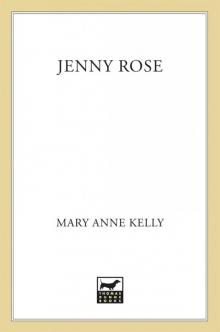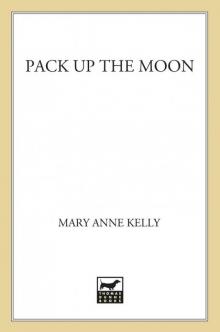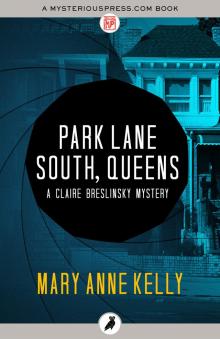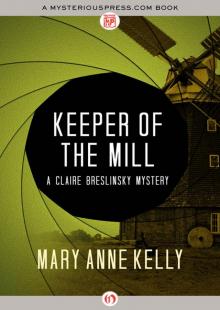- Home
- Mary Anne Kelly
Keeper of the Mill Page 4
Keeper of the Mill Read online
Page 4
Isolde shrugged, pretending she didn’t know or care. She was as impressed with films and film people as Claire was, but she wouldn’t have them outshadowing her own performance. Enhance, yes. Outshadow, no. “That’s what I mean about you.” She frowned. “You always get involved.”
“Involved? Oh, really, Isolde! All I said was—”
“Yes. Where you don’t belong.”
“What are you talking about? Now you sound just like my husband.”
“Ugh! Let’s not bring him into this.”
“On that we agree.” Claire sniffed but said no more. She wasn’t going to share her fears and jealousies about her husband with Isolde. Wistfully, she smoothed her skirt. One of Isolde’s long black hairs had settled there. Claire shuddered. She pulled it furtively to the window and let it out.
“Rupert is in Switzerland, by the way,” Isolde said. Rupert was the younger of Isolde’s two sons. The older boy, Dirk, was at the American school. At least he was nearby. “He’s up at Klosters,” Isold added. Claire wanted to ask if Rupert still stuttered but decided against it. It made her too unhappy to think of Isolde’s boys so isolated and far from home.
“Oh, and listen,” Isolde warned, “don’t mention the wedding to Hans von Grünwald, the keeper of the Mill.”
“Why not?”
“Or to anyone else who works there, for that matter.”
“How come?”
“Just do as I ask you, all right? He’ll charge me double if he thinks the party I’ve booked is for a wedding.”
“For heaven’s sake! He’ll know soon enough.”
“I’ll just pretend it was a last-minute decision and will fit nicely into the family gathering I’ve planned.”
This wouldn’t do at all. Claire needed the wedding as an excuse while she poked around. “But I’m supposed to be your photographer! What am I supposed to be doing, hanging around an old mill on my own for a couple of weeks?”
“Pretend you’re recovering from a nervous breakdown. You might as well be.” Her critical, snappy eye swept over Claire’s jet-lagged state. “And since when do you owe Reception a raison d’etre, anyway?”
“Hang on a second.” Claire laughed. “I smell a rat. There’s something else you’re not telling me.”
“No. Oh, all right, yes. If you must know, Hans von Grünwald has been desperately in love with me for years. I didn’t want to actually tell him about Blacky until—well, the thing is, Blacky and Hans despise each other. If Hans knew I was marrying him, he’d never let me have Saint Hildegard’s Mill.”
“I think you’re exaggerating. Who isn’t in love with you and hasn’t been that way for years? As I know men and their all-important businesses, it would hardly stop any of them from making a profit on the competition.”
Isolde answered with a scornful face as if to say, “A lot you would know about men being desperately in love with you.”
“I think—” Claire started to say.
“Never mind what you think. Just don’t mention it.”
There. That was better. They were both more comfortable with Isolde at the top. So had their relationship begun and thrived, and so must it remain if it was to go on. Claire didn’t mind. She’d grown up under her sister Carmela’s thumb and felt comfy there. However would she come off so virtuous without a meanie bitch around to make her look good? She was no longer the thoroughly arbitrary girl Blacky had always summed her up as, but she had developed a finer sense of self in recent years, sparring with her feisty husband and the same belligerent sister who’d originally held her down. So she would sit still like a good little girl, but only as long as it pleased her. People did change, she noted smugly. “People do change,” she said.
“They do not.”
“You’re wrong. They do. I have.”
“No, you haven’t. The people around you have, that’s all.” She reached over suddenly and took Claire’s hand. “Why don’t you forget about everybody in New York, Claire? Why not just forget them while you’re here?”
Claire digested this idea and watched the busy, crisp part of town become the easy green streets and alleys of Schwabing and the English Garden. It was going to be a glorious day. Students lolled in outdoor cafes, and uninhibited young people stripped off their clothes along the lazy banks of the Isar. “Well,” she said finally, “perhaps both. The people around me have changed, and that’s changed me.”
“There’s a sophomoric observation.”
“And these are different times.” Claire ignored her. “For example, I grew up not knowing I didn’t have to defer to men. The world has changed.”
“Ach! The world never changes.”
“Yes, it does.”
“No, it doesn’t. It just goes round in circles.”
“We certainly do.”
This seemed to satisfy them both and they traveled pluggedly on, the snow-capped Alps in the distance, the buildings growing sparse and the pines above and around them growing dense. They drove onto a small lane, and the sudden quiet was broken by a bird’s call, warning, welcoming. They turned the corner then. Isolde stopped the car. The old Mill stood on a faraway hill, patient and once apricot, brocaded with ivy and bougainvillea creepers. There was the Isar below, spangling in a sinuous curve across the meadow. You could just make out the edge of the Roman Bridge behind the vast lawn stretched before them, green and cockeyed as a full-moon sea. One great chestnut alone on a tilted slope just before them shaded a winsome chapel.
“Saint Hildegard’s Mill,” Isolde said.
The air was wild and heavy with the distinctive scent of black currant blossoms, and Claire thought of Iris, remembered for her. Here it was that she must have rested. She could almost see her lying in her bedraggled party dress, those many years ago. Here was where it had begun.
Confused, she looked again. That was a woman lying there beneath that tree. A beautiful woman from long ago. A shiver ran up her spine. She reached, instinctively, for her camera bag.
“All right,” came an irritated voice from the thicket, “now you’ve had your thorough look-see, would you very much mind getting on?”
Startled, Claire and Isolde scanned the foliage for the source of the voice.
“Or,” it went on, and they saw him then, in his film director’s khaki, many-pocketed camouflage vest, “we could write you both into the scene. Shall we do that then, Puff?” he said to the smallish, red-nosed fellow at his elbow. “Shall we write them in?”
“Pretty enough,” the other one said, “clothes are all wrong, though. Wrong season.”
“Wrong decade, I should think.” Isolde took it all in and came right back.
“World War Two,” the one referred to as “Puff” clarified for them, “so we’re all right.” He stepped forward, extending a hand. “Puffin Hedges is my name. And this is Temple Fortune.”
“We’ve met,” Isolde said. She nodded curtly to the notorious Temple Fortune, and the two of them took off, chatting each other provocatively up and down, doing their obligatory predator’s dance. They’d recognized each other as worthy adversaries, neither admitting to being overly impressed with the other but insisting each admire the traits that made the other famous.
“Tell you what,” Puffin Hedges interrupted finally, with his busy headwaiter/homeroom-teacher authority. “You two run along, and we’ll get back to work, and we’ll all meet up later for tea.” He waved to their slowly-becoming-annoyed film star still out there under the tree. She was being powdered by the makeup person on one side while a young man was reading her face with a light meter on the other. Gamely, she waved back.
Isolde roared off down the road with an appropriate cloud of dust. Boy, her squared-off shoulders seemed to shimmy and brag, did they get a load of me!
Claire didn’t say a word. She let her cotton sweater tumble from her warm arms.
Temple Fortune had been a shock. Although he’d spent the entire episode flirting outrageously with Isolde, Claire hadn’t missed the momen
t’s hesitation when he’d laid eyes on and over her. He might have been speaking with Isolde, but Claire recognized the pained sucking in of breath as his eyes swept Claire’s generous breasts and hips. She almost felt his eyelids lower with desire. A warm, rosy flush had crept recklessly up her married cheeks. Her body, she realized shamefully, was not as committed to family life as she was.
Not only that, but she had seen Temple Fortune before. It was so long ago, she’d been a different person; a little girl, really, just starting out on her own from her parents’ house with a bright mess of pimply girlfriends to the Keith’s Movie Theater, not to miss the arrival of the British Invasion rock group. They weren’t the rock group, but they were popular enough to draw the prerequisite mob of screeching teenagers, and Claire had wriggled through the crowd to the front by the police barricade just as they were disembarking the huge airport bus.
They were adorable, all of them, but there had been one who’d looked directly into Claire’s gaga blue eyes, held her glance, swept her brazenly with hooded, merry eyes, made a face as if to say, “If only …,” winked philosophically and was bustled off with the rest of them to the stage inside.
Claire had stayed warm and pink for weeks. She’d bought every album and learned every song. When he’d sung lead, she’d lain reverently down on her bed and relived that magical moment they’d shared, only she’d take it farther—sometimes she’d pretend they held each other longingly, hopelessly, backstage. Sometimes he found out magically who she was (from a theater manager who doubled as a CIA agent, she supposed), and sent for her from England, where she would suddenly appear in a cashmere suit on a steamship gangplank, to be swept off to his parents’ estate (on the moors?).
Claire laughed out loud.
“What?” Isolde said.
“No, nothing.” Claire shook her head. So the famous Temple Fortune was not Temple Fortune after all. Or if he was, he was someone else as well. At least his name was not so fancy. Still, she would never forget it. He was, or had been at one time, the adorable, guitar-playing Douglas Dougherty.
You don’t fantasize adolescent love to one man’s collage of fan-magazine photos for more than two years and not recognize him—what? Twenty-something years later? Claire shuddered to think how many years had gone by. She flipped the sun visor down and peered into the makeup mirror. Yuck. She snapped it humbly back up, and the car swerved into the white pebble drive. They got out of the car and she had a good stretch. There was a bunch of freshly painted white chairs and round tables by the door. A sort of runty collie-mutt lifted its sleepy head, yawned and went back to sleep.
“Always reassuring to know you’ve got a good guard dog to keep you safe,” Claire remarked to the decrepit old woman sitting at one of the tables wrapping knives and forks into paper napkins.
“Oh. He’ll let you in, all right. Just don’t try to leave. He won’t let anyone leave.”
“Thanks for the warning.”
“Keep that crazy dog away from me!” Isolde froze behind Claire. “He almost bit my arm off last week!”
“Were you leaving?” Claire unclasped Isolde’s hand.
“Yes.”
“That was your first mistake. Never”—she winked at the old hag at the table—“try to leave.” But the woman had forgotten any communication between them and gone back to her work.
Claire inhaled the fragrant air. The Mill was edged in billowy pink rhododendron and white lilac. The tulips were done and poppies beginning to bud. Rounded paths were riddled with chamomile and lily of the valley.
Whoever the gardener was, he or she was passionate. It was wonderful.
From the upstairs window trickled the sound of somebody playing the piano. The music stopped abruptly, and there was the muffled garble of argument. A door slammed. There was, Claire was delighted to see, a maypole glinting jauntily in the sunshine. A man with an intricately wood-carved cane came to the open front door. A sporty-looking, beefy, absolutely-in-charge fellow with not much of his fine blond hair left. He was no longer young, but not old either. Adam von Grünwald’s son? Claire wondered. She watched him carefully. Was this the son of the man Iris had loved so much? He was so fair. He’d been wearing a white apron over his spanking blue-and-white-checkered shirt. He threw it off and strode over with a trace of a limp. He was huge. His cane, Claire noticed, sported a hand-carved bird’s head at the top. He swirled it with a drum majorette’s flourish. He had bright-blue, shrewd peasant’s eyes that went almost stupidly besotted the minute he turned them on Isolde.
“Oh, Hans,” she said offhandedly, “here is Claire Breslinsky. She’ll be staying with you. From New York.”
“Ah! Direkt aus New York? Manhattan?” He gave her hand a hearty shake.
“Actually, no. We come from Queens. We—”
But Hans had already turned his attention back to Isolde. Every backwoods Bavarian knows you only have to cross the Queensboro Bridge from dazzling Manhattan and you’ve entered the mud puddle of cultural oblivion. Hardly a German hasn’t already been to New York on a charter, stayed at the Plaza, shopped at Bloomingdale’s, eaten vinegar dumplings in Chinatown, marched up Madison, jogged through Central Park, and gone home, job done, one more must-see city under their belts, meine Liebe.
Hans swung Claire’s suitcase over one strong shoulder and linked the other arm with Isolde. “Evangelika,” he snapped at the old woman, “Mach mal schnell! Hurry up!” And he and Isolde disappeared into the cool darkness of the Mill.
Evangelika, nonplussed, snorted and spat onto the gravel before she followed him in. The yard was still. Only the film crew in the near distance tinkered with their long lenses. A quite big bird pecked away and breakfasted happily on a long line of freshly buried sunflower seeds.
Then a beautiful girl, about eighteen, slipped from the back of the inn to the side where only Claire could see her and, imagining herself unobserved, dropped her small head of heavy, Gretel-like braids into her hands and wept.
She was so young and so fair that Claire’s first impulse was to call out to her, or run over and comfort her, the way you would run to a brokenhearted child. But the moment passed. Claire knew well enough that people didn’t like to be caught suffering. She turned and took her camera bag and went inside.
It took a moment for her eyes to adjust to the darkness. Rough beams supported the low-ceilinged room in restless patterns. The floor was so old it tilted. Claire felt strangely dizzy. It was like finding yourself below on a pirate ship.
Hand-painted tiles and plates and steins lined a shelf stretching around the top of the room. Exquisitely simple pottery pieces graced the shelves just above eye level. There were clocks of all sizes, each from years ago, all ticking at a different speed and blending into a delicious busy hum. Each table had creamy-white linen and a cut-glass vase of forget-me-nots. Oils and watercolors in museum-quality frames filled every available space.
“Hello,” Claire called, but there was no one there. She walked down the hallway to Reception. This was a great dark room with a huge polished desk. They really didn’t cater to guests here, did they, Claire thought as she was standing there. She walked through to the kitchen. Two women sat beneath gleaming copper pots and plaited straw flowers. Behind them in the chimney, last night’s fire had been swept and the tiles scrubbed. The old one, the one Claire had seen outside, Evangelika, slovenly but sitting erectly at the long pine table, continued, mantra-like, to wrap her cutlery and stack it into perfect piles. She scarcely looked up.
Herbs grew in every window, with the other green of the backyard looking in. Up the hill from there was the path to the Roman Bridge. It really was from Roman times and, Claire knew, had played a great part in many battles. Hilde-gardians were quite partial to their romantic, crumbling bridge.
The other woman was hand-writing menus and arranging them on spindle wires on a wicker dessert trolley. She was a bristling woman, the sort who never could stand Claire. Claire never knew why, but she always sensed it right away. T
he woman wore a tailored gray suit and a string of good pearls. She had that rosy, creamy complexion, marless and seamless, that almost requires pearls.
“Kann ich Ihnen helfen?” the woman asked, and then, summing Claire’s nationality up with a quick, irreverent sweep of her shrewd, brown, smallish eyes, “May I help you?”
The way she said it, with tight-lipped disapproval, led Claire to feel she ought not to be in there at all, this was entirely off limits. Claire couldn’t resist putting one antagonistic foot into the forbidden kitchen. “I’d like to check in,” she said.
The prim and properly corseted one stood up to her full height, which was not a lot taller than when she was sitting down.
They confronted each other. The soft, flowing lines of Claire’s wardrobe were admittedly “designed” by Evar, the kindly Indian man on Jamaica Avenue, but she always started out clean and well ironed. And if not ironed, then hung scrupulously and swiftly from dryer to hanger.
This woman’s taste in clothing bordered on the compulsively dry-cleaned. She even wafted a sort of right-angle myrrh as she bustled past in her shantung suit, indicating with a rude flick of her hand that Claire should follow. She was a bit well endowed, but you’d better not notice, dared the haughty, ramrod posture, the raised fluffy eyebrows and the pursed pink lips. Her sensibly heeled shoes clicked past Claire. Claire’s eyes met those of the scrawny, elderly woman in the slovenly house dress. Her eyes said nothing. Neither, Claire decided, would hers. She turned and followed the woman to the front desk. The woman snapped open the leather-bound guest book. “Passport,” she demanded and was not pleased when she realized Claire had put it in front of her.
When she was finished, she stood up and marched away. “You will follow me,” she ordered.
“Jawohl,” Claire said, grinning, then frowned appropriately when the woman turned back to glower.
There was a certain sort of German, Claire knew, who didn’t care much for Ausländer, or foreigners, even if they did earn their livelihood from them, so Claire didn’t take the woman’s disdain personally. This one, Claire realized, was younger than herself. It was always a bit of a rude awakening to identify bossy, authoritative figures as younger than oneself, but there you were; the world flies by and you find yourself who you used to want to be.

 Foxglove
Foxglove Jenny Rose
Jenny Rose Pack Up the Moon
Pack Up the Moon Park Lane South, Queens
Park Lane South, Queens Keeper of the Mill
Keeper of the Mill Twillyweed
Twillyweed